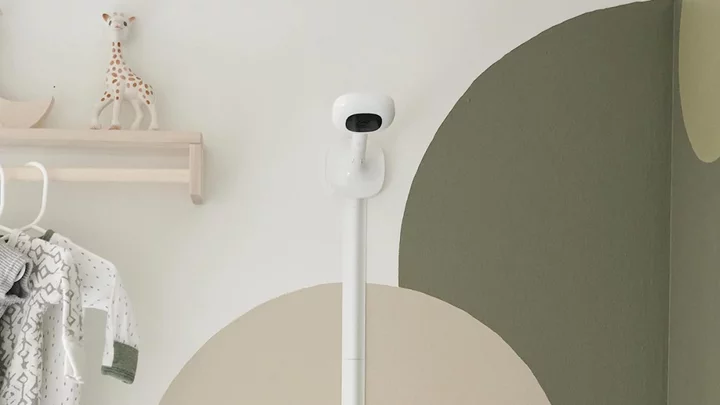
Amazon Doubling Same-Day Delivery Facilities in Push for Speed
Amazon.com Inc. will double the number of US same-day delivery facilities in the “coming years,” the company announced
2023-07-31 19:51

Prince William serves veggie burgers to stunned customers
Prince William has shocked unsuspecting members of the public at a food truck in London when he appeared as the server handing out veggie burgers.
2023-07-31 19:22

Has America’s Air Travel Boom Peaked?
The air travel boom in the US appears to be fading. Purchases by US consumers directly from major
2023-07-31 17:56

Experts reveal why you keep waking up at 4am, and how you can prevent it
Ever find yourself awake, staring into space at four in the morning? Is it just a bad habit, or is there something more sinister going on? And why does it always seem to happen at 4am? “We start to experience less deep sleep after around four to five hours,” says Lisa Artis, deputy CEO of The Sleep Charity, who have partnered with Simba mattresses. And once we’re in that lighter sleep faze, we wake much more easily. If you generally fall asleep around 11pm – which is a very common bedtime, 4am wake-ups are more likely. And there are many factors leading to these inconvenient stirrings. Hormones “Sleep is guided by our internal clock or circadian rhythm. One of the most significant and well-known circadian rhythms is the sleep-wake cycle,” Artis continues. “Sleep is regulated by the levels of two hormones: melatonin and cortisol, which follow a regular 24-hour pattern. Melatonin assists you in dozing off, while cortisol helps get you up, and keeps you awake,” she explains. Keeping an eye on your hormones is important in preventing those late-night wake-ups. “Engage in calming activities before bedtime, such as reading, listening to soothing music, or practising relaxation techniques, like deep breathing or meditation,” says Dr Mariyam H. Malik, GP at Pall Mall Medical. Equally, pop your phone down for a bit. “Blue light from electronic devices can suppress melatonin production. Try to avoid screens for at least two hours before bedtime, or use blue light filters. It is best to charge them in a separate room overnight,” Malik adds. Diet Caffeine, heavy meals, alcohol, sugar, and a lack of magnesium or B vitamins could lead you to have a more disturbed night’s sleep, according to Malik. Sugar and carbohydrates may have a particular impact. “A diet high in sugar and refined carbohydrates can cause blood sugar fluctuations, leading to wakefulness during the night,” she says. “It’s unlikely you’ll feel hungry in the middle of the night if your blood sugar dips,” notes Artis, “but to reduce ungodly hour awakenings, trial alternatives for your last meal or snack of the evening. Instead of carb or sweet-based snacks, opt for protein-packed and magnesium-rich foods, like hard boiled eggs, cottage cheese, pumpkin seeds, spinach, dark chocolate, cashews, chicken thighs or turkey.” Protein can take the edge off your night-time hunger, she says, while magnesium is known to support sleep. Needing a wee Do you wake up needing to wee at the same time every night? “Try not to drink excessive amounts of fluids before bedtime,” advises Malik. “It’s important to stay hydrated, but try not to drink anything for around two hours before your usual bedtime. Go to the toilet before you go to bed to empty your bladder. ” Age and life stage “Sleep tends to become more disrupted as people get older,” Malik explains. “Sleep patterns change with age, and various factors can contribute to sleep disturbances in older adults. Some common reasons for sleep disruption in the elderly include changes in your circadian rhythm, decreased melatonin production, medical conditions or medications, and potential sleep disorders.” It can also affect women during the perimenopause. “The reproductive hormones – oestrogen and progesterone – are entwined with the sleep and relaxation hormones, melatonin and serotonin,” says Artis. “When oestrogen begins to fall before and during menopause, it can create a disturbance in the sleep-promoting hormone melatonin, meaning it can’t properly balance out cortisol. When this happens, the ability to fall and stay asleep is affected.” Recurring hot flushes, night sweats, dry skin, and low libido can signal waning oestrogen. Artis advises incorporating foods with high levels of phytoestrogens into your diet throughout the day to help with this. “Phytoestrogens imitate the natural estrogens found in your body. As a consequence, they can bind to your body’s oestrogen receptors and produce similar effects.” Try lentils, kidney beans, chickpeas, tofu, edamame, spinach, cauliflower and broccoli. Worrying Stress is not good for sleep. One study by Bupa even found that 32 million Brits wake up worrying about their health at precisely 4:05 am. The report, which surveyed 4,000 British adults, revealed that more than three-fifths of us wake up in the middle of the night. If you are finding yourself awake at all hours worrying, or waking up with stressful dreams, there are a few things that may help. “Keep a journal by your bedside and write down your worries before going to bed. This practice can help get your concerns out of your mind and onto paper, making it easier to let go of them temporarily,” says Malik. You may also want to “engage in mindfulness or meditation exercises before bedtime. Mindfulness can help you focus on the present moment, reducing anxiety about the past or the future.” Read More Men have a problem – and it won’t be solved by either Andrew Tate or Caitlin Moran Elon Musk reacts to ex-wife Talulah Riley’s engagement to Thomas Brodie-Sangster Thomas Brodie-Sangster references Love Actually in sweet engagement announcement with Talulah Riley Charity boss speaks out over ‘traumatic’ encounter with royal aide Ukraine war’s heaviest fight rages in east - follow live
2023-07-31 17:19

Red-Hot Markets and Extreme Heat: Saturday US Briefing
Hello, it’s been a scorching week, both literally and in markets. Here’s something to help you catch up
2023-07-30 01:54

How to watch as France vs. Brazil highlights exciting Day 10 of Women's World Cup
Day 10 of the 2023 Women's World Cup should prove to be a thriller.
2023-07-29 09:28

Wing Prices Are Surging, Threatening Wingstop Shares
The price of the chicken wing is going up, and that may spell trouble for Wingstop Inc., according
2023-07-29 04:48

The Best Baby Monitors for 2023
Your baby needs constant attention, but you can't be in their room every hour of
2023-07-29 04:27

Royal Caribbean Cruises Eyes Pre-Covid Record With Earnings-Fueled Rally
Strong demand from consumers willing to pay up for bookings pushed Royal Caribbean Cruises Ltd. shares to the
2023-07-29 02:59

Experts reveal the most unhygienic things in your kitchen – and how to get them clean
It’s likely there are countless things in your kitchen which look clean, but actually, they’re filthy. Could your dishcloths be making you sick? When was the last time you washed your tea towels? And do we really need to bleach the sink more than once a month? We asked an expert to find out. Knobs, door handles, and buttons The buttons and dials on your kitchen appliances could be a germ-fest. “People often neglect to clean these areas of the kitchen,” says Danielle Mason, a cleaning content creator – or ‘cleanfluencer’ – who creates tutorials and videos on TikTok and Instagram. “Most of the time, they don’t think it is important, but as you’re commonly handling raw meat and food, it’s extremely important to keep these areas clean, due to cross-contamination. “Always sanitise with a cloth – I like to do this with Zoflora, as it leaves a great smell afterwards, and kills bacteria from dirty fingers.” Cloths If what you clean with isn’t clean, chances are, your kitchen isn’t either. “I always leave my cloth to soak in bleach before going to bed every night,” says Mason. “This enables a new start in the morning with no bacteria. Also, make sure you’re replacing the cloths – I would suggest a new one every two weeks, whilst still bleaching every night. And make sure you’re not using this cloth on anything other than the kitchen, as you do not want to cross-contaminate.” Sponges Mason stresses sponges are unhygienic, as they’re constantly damp and can carry E. coli. “People tend not to use sponges, as they carry so many more germs, and even putting them in the microwave will not kill all of them. Avoid a sponge where possible.” Dish towels Dish towels and tea towels may not be changed anywhere near often enough. “You should have one for every day of the week, as they carry so many bacteria and germs, which get spread across the kitchen. If you’re drying pots and pans, and then wiping down your surfaces, it’s not good,” she says. Chopping boards Chopping boards – particularly wooden ones – could be a haven for bacteria. “You should have a different colour for different types of food, one for meat, fruit, and other foods,” advises Mason. “The best way to clean them is in a dishwasher, as it’s good to get rid of all the germs due to the very high heat. If you don’t like the dishwasher, then boil the kettle water and leave the chopping boards to soak in it. I use a steam cleaner on mine, as it kills 99.9% bacteria and there are no chemicals.” It is best to avoid wooden chopping boards altogether, as these cleaning methods may damage them. Kitchen sink “This is a massive breeder of bacteria and grime; a distinct microbiome is found in sinks. “The plumbing area found beneath sinks revealed microbial communities dominated by a group of bacteria called Proteobacteria. This phylum includes pathogens such as Salmonella and E. coli, which can cause serious disease,” Mason shares. “I’ve always been taught never to wash my hands in the sink, and to never throw dirty water down the sink. You wash your cups and plates in the sink and prepare food, so it should always be kept clean, and nothing from outside the kitchen should cross-contaminate that. For example, never wash your floors and put dirty water in your kitchen sink, always throw it down the toilet.” How do you possibly clean the inside of your sink and drains? “Baking soda and vinegar is the best way to clean your sink out, or bleach, but you must be careful with bleach, as it can stay in the bottom of your sink, depending on the material it’s made of. I clean my sink out every day.” Pipes and cupboards around your sink could be leading you to have a rodent problem. “You can prevent mice and rodents from entering the kitchen by covering any small crevices or cracks. It is also important to repair leaks as soon as they happen, as they can come through the pipes,” she says. Fridges “Deep clean [your fridge] every two months. A normal cleaning – the wiping of shelves – should be done every other day with soapy water. For any bad smells, use baking soda, which will absorb the smell from the fridge,” Mason continues. “The fridge is a breeding ground for salmonella, E. Coli and other bacteria.” Bins Where you throw your waste away could be a breeding ground for germs. “Make sure you keep [outdoor] rubbish bins away from your house, and make sure you empty your bin as soon as it’s full,” advises Mason. “I personally do not keep a bin in the kitchen, I use a bag and I take that out by the end of the day, but if you are using a bin, make sure you bleach it with hot kettle water, to keep it smelling fresh.” Read More This is why you keep waking up at 4am – and what you can do about it TV chef James Martin reveals cancer diagnosis in apology over ‘bullying’ allegations Bursts of activity that make you huff and puff ‘linked to reduced cancer risk’ Charity boss speaks out over ‘traumatic’ encounter with royal aide Ukraine war’s heaviest fight rages in east - follow live
2023-07-28 17:48

This is why you keep waking up at 4am – and what you can do about it
Ever find yourself awake, staring into space at four in the morning? Is it just a bad habit, or is there something more sinister going on? And why does it always seem to happen at 4am? “We start to experience less deep sleep after around four to five hours,” says Lisa Artis, deputy CEO of The Sleep Charity, who have partnered with Simba mattresses. And once we’re in that lighter sleep faze, we wake much more easily. If you generally fall asleep around 11pm – which is a very common bedtime, 4am wake-ups are more likely. And there are many factors leading to these inconvenient stirrings. Hormones “Sleep is guided by our internal clock or circadian rhythm. One of the most significant and well-known circadian rhythms is the sleep-wake cycle,” Artis continues. “Sleep is regulated by the levels of two hormones: melatonin and cortisol, which follow a regular 24-hour pattern. Melatonin assists you in dozing off, while cortisol helps get you up, and keeps you awake,” she explains. Keeping an eye on your hormones is important in preventing those late-night wake-ups. “Engage in calming activities before bedtime, such as reading, listening to soothing music, or practising relaxation techniques, like deep breathing or meditation,” says Dr Mariyam H. Malik, GP at Pall Mall Medical. Equally, pop your phone down for a bit. “Blue light from electronic devices can suppress melatonin production. Try to avoid screens for at least two hours before bedtime, or use blue light filters. It is best to charge them in a separate room overnight,” Malik adds. Diet Caffeine, heavy meals, alcohol, sugar, and a lack of magnesium or B vitamins could lead you to have a more disturbed night’s sleep, according to Malik. Sugar and carbohydrates may have a particular impact. “A diet high in sugar and refined carbohydrates can cause blood sugar fluctuations, leading to wakefulness during the night,” she says. “It’s unlikely you’ll feel hungry in the middle of the night if your blood sugar dips,” notes Artis, “but to reduce ungodly hour awakenings, trial alternatives for your last meal or snack of the evening. Instead of carb or sweet-based snacks, opt for protein-packed and magnesium-rich foods, like hard boiled eggs, cottage cheese, pumpkin seeds, spinach, dark chocolate, cashews, chicken thighs or turkey.” Protein can take the edge off your night-time hunger, she says, while magnesium is known to support sleep. Needing a wee Do you wake up needing to wee at the same time every night? “Try not to drink excessive amounts of fluids before bedtime,” advises Malik. “It’s important to stay hydrated, but try not to drink anything for around two hours before your usual bedtime. Go to the toilet before you go to bed to empty your bladder. ” Age and life stage “Sleep tends to become more disrupted as people get older,” Malik explains. “Sleep patterns change with age, and various factors can contribute to sleep disturbances in older adults. Some common reasons for sleep disruption in the elderly include changes in your circadian rhythm, decreased melatonin production, medical conditions or medications, and potential sleep disorders.” It can also affect women during the perimenopause. “The reproductive hormones – oestrogen and progesterone – are entwined with the sleep and relaxation hormones, melatonin and serotonin,” says Artis. “When oestrogen begins to fall before and during menopause, it can create a disturbance in the sleep-promoting hormone melatonin, meaning it can’t properly balance out cortisol. When this happens, the ability to fall and stay asleep is affected.” Recurring hot flushes, night sweats, dry skin, and low libido can signal waning oestrogen. Artis advises incorporating foods with high levels of phytoestrogens into your diet throughout the day to help with this. “Phytoestrogens imitate the natural estrogens found in your body. As a consequence, they can bind to your body’s oestrogen receptors and produce similar effects.” Try lentils, kidney beans, chickpeas, tofu, edamame, spinach, cauliflower and broccoli. Worrying Stress is not good for sleep. One study by Bupa even found that 32 million Brits wake up worrying about their health at precisely 4:05 am. The report, which surveyed 4,000 British adults, revealed that more than three-fifths of us wake up in the middle of the night. If you are finding yourself awake at all hours worrying, or waking up with stressful dreams, there are a few things that may help. “Keep a journal by your bedside and write down your worries before going to bed. This practice can help get your concerns out of your mind and onto paper, making it easier to let go of them temporarily,” says Malik. You may also want to “engage in mindfulness or meditation exercises before bedtime. Mindfulness can help you focus on the present moment, reducing anxiety about the past or the future.”
2023-07-28 15:55

A Brief History of SPAM
From Monty Python to Minnesota's SPAM Museum, this little packaged luncheon meat has a big cultural footprint.
2023-07-28 03:17
